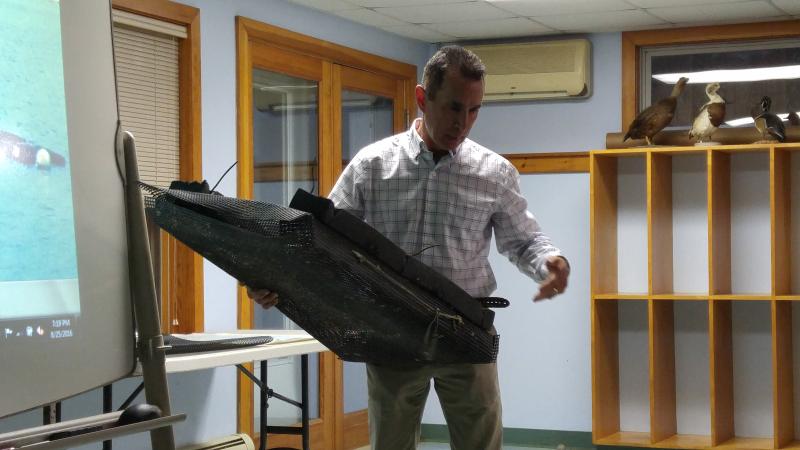Lloyd Center panel discusses oyster farming
The Lloyd Center introduced the art of oyster farming to 25 local science and seafood buffs on August 25 by inviting three farm operators to talk about their work.
“I looked at the oysters and they were three inches across, which is marketable,” said Steve Caravana about his first harvest. “The water must have steroids in it or something."
Caravana founded Dartmouth’s first—and so far only—commercial oyster farm last May. When he checked on its progress in July, he was shocked to discover that the oysters had much quicker than he had anticipated.
He ended up with a yield of 31,000 oysters in 2015, well above what he thought he would start with, but not enough to generate a profit. He did managed to break even for his first full year, and said he could end up with a profit this year.
Caravana had started his operation by buying about 70,000 oyster seeds, which he then planted in Padanaram Harbor. He routinely visits the 80 floating cages that host the seeds, and by the end of summer, the oysters are large enough to send to market.
Lloyd Center Outreach Educator Erika Fernandes talked about a small oyster farm run on the property. The farm—installed in April—is smaller in scale than Caravana’s farm, but serves as part of a feasibility study to determine if oysters will grow in Dartmouth waters.
The plan—organized by the Dartmouth Harbormaster’s Office—would introduce oysters into Dartmouth waterways to help battle nitrogen pollution, following state approval. Fernandes said the Lloyd Center team recently checked the farm and discovered that the oysters have grown to about 3 centimeters in size.
The center also brought in fifth graders from its Turn the Tide education program to help out with the oyster farm.
“When the kids show up and learn that they will take part in real science, they love it,” Fernandes said. “They take it a lot more seriously.”
The program encourages students to learn about the town’s watershed; they measure and monitor the oysters, and learn about how the shellfish live.
Dave Bill and Jennifer Albright, of Tabor Academy’s science departments, help oversee an oyster farm on campus. Tabor Academy opened its oyster farm in the summer of 2013, and while it helps support the health of Marion waterways, it also provides students with opportunities for hands-on learning.
Tabor students better connect with their community and learn a bit of science by tracking the growth of oysters over time and performing tasks to support the farm, said Bill.













